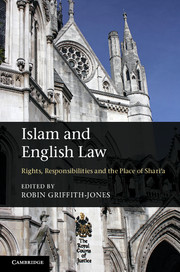Book contents
- Frontmatter
- Contents
- List of contributors
- List of abbreviations
- Preface
- Introduction
- Part I The Archbishop of Canterbury and shariʽa law
- 1 The ‘unavoidable’ adoption of shariʽa law – the generation of a media storm
- 2 Civil and religious law in England: a religious perspective
- Part II The Archbishop’s proposal for ‘transformative accommodation’
- Part III Responsibilities and rights
- Part IV Prospect: equality before God and before the law
- Select bibliography
- Index of cases
- Index
- References
2 - Civil and religious law in England: a religious perspective
Published online by Cambridge University Press: 05 April 2013
- Frontmatter
- Contents
- List of contributors
- List of abbreviations
- Preface
- Introduction
- Part I The Archbishop of Canterbury and shariʽa law
- 1 The ‘unavoidable’ adoption of shariʽa law – the generation of a media storm
- 2 Civil and religious law in England: a religious perspective
- Part II The Archbishop’s proposal for ‘transformative accommodation’
- Part III Responsibilities and rights
- Part IV Prospect: equality before God and before the law
- Select bibliography
- Index of cases
- Index
- References
Summary
The title of this series of lectures, ‘Islam in English Law’, signals the existence of what is very widely felt to be a growing challenge in our society – that is, the presence of communities which, while no less ‘law-abiding’ than the rest of the population, relate to something other than the British legal system alone. But, as I hope to suggest, the issues that arise around what level of public or legal recognition, if any, might be allowed to the legal provisions of a religious group, are not peculiar to Islam: we might recall that, while the law of the Church of England is the law of the land, its daily operation is in the hands of authorities to whom considerable independence is granted. And beyond the specific issues that arise in relation to the practicalities of recognition or delegation, there are large questions in the background about what we understand by and expect from the law, questions that are more sharply focused than ever in a largely secular social environment. I shall therefore be concentrating on certain issues around Islamic law to begin with, in order to open up some of these wider matters.
Among the manifold anxieties that haunt the discussion of the place of Muslims in British society, one of the strongest, reinforced from time to time by the sensational reporting of opinion polls, is that Muslim communities in this country seek the freedom to live under shariʽa law. And what most people think they know of shariʽa is that it is repressive towards women and wedded to archaic and brutal physical punishments; just a few days ago, it was reported that a ‘forced marriage’ involving a young woman with learning difficulties had been ‘sanctioned under shariʽa law’ – the kind of story that, in its assumption that we all ‘really’ know what is involved in the practice of shariʽa , powerfully reinforces the image of – at best – a pre-modern system in which human rights have no role.
- Type
- Chapter
- Information
- Islam and English LawRights, Responsibilities and the Place of Shari'a, pp. 20 - 34Publisher: Cambridge University PressPrint publication year: 2013
References
- 3
- Cited by



